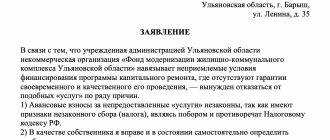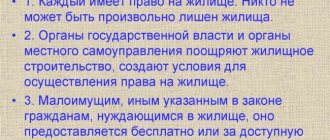Having illegally entered someone else's house, a person will be required to answer before the law. Criminal liability is imposed for this. The legislation requires that before entering a home, you must obtain the consent of the owner or have the appropriate court verdict with you.
In all other situations, the act is regarded as illegal entry.
Illegal entry into a home
Peculiarities
Based on Article 25 of the Constitution of our country, it is permissible to enter someone else’s house in the following circumstances:
- if the owner or tenant agrees to this;
- in situations regulated by federal legislation;
- by order of the court.
The right to inviolability of housing concerns only certain subgroups of citizens. First, you need to provide documentation stating that the citizen has something to do with housing.
If a person is against people entering his home, and no special situations have occurred, then entry will be illegal
Who is affected by the inviolability of the home:
- owner;
- citizens who have the right to use housing on the basis of a lease, sublease, lease or order;
- citizens who moved into this housing based on the wishes of the residents who are there legally.
Corpus delicti
The object is the right of citizens to their own real estate and the inviolability of their home, which is ensured by Article 25 and Article 35 of the Constitution of the Russian Federation, and the subject is the apartments and houses themselves, dachas, etc. They cannot be warehouses, any office premises, utility rooms, etc.
The subject of the offense is real estate.
The right to the inviolability of a home is recognized as the right to use or own property in the presence of appropriate documents (lease or rental agreements, certificate of ownership, etc.) confirming this, as well as the right of those persons who live there legally at the will of the owner himself.
For Part 1 and Part 2 of Article 139 of the Criminal Code of the Russian Federation, the subject is a legally competent person who has already crossed the age line of 16 years , and for Part 3 - also a person who has used his privileges at work.
Objective and subjective sides
The objective side is characterized as an active form of action by a person in the form of illegal entry into a home, without any right to do so. The way in which this is done is not particularly important.
It can be secret or open, in the presence of the owner himself or other persons, using technical or other means . If in this case deception was used on the part of the criminal, then there will be no corpus delicti, since he entered the residential premises with the permission of the victim, although he was in error.
The subjective side is expressed in the form of guilt - direct intent.
Housing concept
Article 139 of the Criminal Code regulates what type of real estate can be considered a home.
Article 139 of the Criminal Code of the Russian Federation
Important ! It is also advisable to include in this term premises that are not part of the housing stock, but are suitable for a person to live there.
In simple terms, any room where a person lives, while storing his property and documents there, can be considered his home. The room itself and the things in it have value, therefore, another person cannot just walk in and take it all away without consequences.
Housing is a room where a person lives and stores his property.
| What can be considered a home: | What a home is not: |
| apartment; | cellar; |
| individual residential construction project; | garage; |
| dorm room; | barn; |
| a room in a hotel; | outbuilding; |
| change house; | places on a train or ship (they can’t even be called temporary housing). |
| garden house; | |
| prefabricated house; | |
| various buildings for housing within the boundaries of construction sites. |
The concepts of “dwelling” and “living premises” in literature
In the literature, “dwelling” means any premises intended or adapted for permanent or temporary residence of people. That is, the concept of “dwelling” is much broader than the concept of “living premises”.
If by residential premises we mean an isolated premises, which is real estate and suitable for permanent residence of citizens, then the concept of “dwelling” includes not only the types of residential premises listed in Article 16 of the RF Housing Code, but also, for example, dachas, rooms in houses recreation, sanatoriums, and even tourist tents adapted for housing.
The list of objects that can be classified as “dwelling” is, of course, not exhaustive.
Some definitions of the concept “dwelling” in the literature:
Dwelling is a room or structure used for temporary or permanent residence, including residential premises occupied legally (Pomazkova S.I. On the concept of housing and its significance for the legality of modern investigation // Operative (detective). 2005. N 1( 2).P. 13.)
Dwelling - any premises, regardless of ownership or right of residence in it, suitable for permanent or temporary residence, carrying out professional or creative activities and having a direct connection with a person, as well as premises adjacent to it or located on the territory of the land plot on which it is located is located (Fatikova A.D. Mechanism for implementing the principle of inviolability of the home in criminal proceedings: Dis. ... candidate of legal sciences. Ekaterinburg, 2010. P. 18.)
Housing is a single comprehensive legal category of constitutional law, which cannot be perceived in parts and arbitrarily interpreted in a narrow sense. Housing legislation uses the category “dwelling” in relation to the presentation of constitutional provisions on the right of citizens to housing and its inviolability, while the housing legislation does not contain any new interpretation of the term “dwelling”. To designate objects of housing rights, it uses another legal category - “residential premises” (Khaldeev A.V. Correlation of the legal categories “residential premises” and “dwelling”: theoretical and practical aspects // Housing Law. 2006. N 6. P. 12.)
.. The concepts of “dwelling” and “residential premises” are not used as synonyms in legislation, if only because a mandatory feature of a residential premises, as already noted, is the criterion of suitability for permanent residence, while a dwelling may also be suitable for temporary accommodation. In addition, the concept of “residential premises”, used in various branches of law (criminal, criminal procedure, labor, family, etc.), is understood differently, which entails inevitable problems in law enforcement practice" (Rostovtseva N.V. On current issues issues of Russian housing legislation // Journal of Russian Law. 2008. N 11. P. 9.)
Objects under protection
Intrusion into a protected facility is punishable by law based on the events of the incident. Punishments are regulated by two codes - administrative and criminal. Based on Article 20.17 of the Code of Administrative Offenses, a citizen will be fined for entering a protected facility. The fine ranges from 3 to 5 thousand rubles. If the criminal used any devices to enter, they are confiscated.
There is a fine for entering a protected facility.
If a person enters the territory owned by an underground or underwater facility, the activities of departmental or state security are regulated by current legislation, then he will also have to answer for this. The fine in such a situation is from 75 to 200 thousand rubles. In addition, they may be placed under administrative arrest for 15 days. Devices that facilitate entry into a protected area may be taken away.
Important ! Administrative rules are appropriate in situations where the violation committed does not have signs that would allow the case to be brought under the jurisdiction of the Criminal Code.
If we consider the Criminal Code, then you will have to answer before the law if a person constantly violates the boundaries of the protected territory of an underwater or underground facility. Then you will have to pay 500 thousand rubles or an amount equal to a year and a half of the criminal’s income. Imprisonment or restriction of freedom for a period of no more than two years is also possible.
According to the Criminal Code, you will have to answer if a person regularly enters a protected facility
When it turns out that the act we are considering was committed by a group of people by prior agreement, the members of this group will have to pay a fine of up to 700 thousand rubles, or pay the amount of their two years’ income.
Important ! Violators can be jailed for up to four years. A similar preventive measure is used when a person may reveal state secrets.
Responsibility regulated by the Criminal Code may occur if the offender is punished under the Code of Administrative Offenses for a similar act.
Responsibility under the Criminal Code will occur if a person was previously punished under the Code of Administrative Offenses
What types of punishments can be imposed
Responsibility for entering private territory can only be criminal, therefore punishments are imposed only under Article 139 of the Criminal Code of the Russian Federation. From its first part the following can be determined:
- a fine of 40,000 rubles or more. or salary for 3 months;
- compulsory work for 360 hours;
- corrective labor for a year;
- arrest for a period of up to 3 months.
If the crime has been classified under Part 2 of this article, then the following sanctions may be imposed:
- a fine of up to 200,000 rubles. or salary for 1.5 years;
- correctional or forced labor for 2 years;
- imprisonment for the same period.
According to Part 3 of Article 139 of the Criminal Code of the Russian Federation, the court may order the following preventive measures:
- fine in the amount of 100,000 rubles. or salary for 1-2 years;
- ban on holding certain positions or activities for 2-5 years;
- forced labor for 3 years;
- arrest for 4 months;
- imprisonment in a colony for a period of up to 3 years.
The specific type of punishment is assigned taking into account the factors that accompanied the incident, as well as whether the citizen had a criminal record, and his social, financial and family status is taken into account.
The punishment is imposed taking into account all the circumstances of the case.
Based on judicial practice, the highest measure – imprisonment in a colony – is very rarely used. Most often, the judge chooses a punishment such as paying a fine.
If the offender has already been prosecuted, the court will apply harsher sanctions to him. Otherwise, he will prefer to give the criminal a chance to reform.
Is it possible to be released from liability?
It can rarely be applied in this case. If in theory it is provided for by the legislative acts of the Russian Federation upon surrender and compensation for damage caused to the owner in the form and amount that were established by the latter, then in practice everything happens somewhat differently.
In most cases, the offender is fined, and if he has a criminal record, he may be sentenced to imprisonment.
For example, citizens rented housing from the owner, who constantly came there both during their presence there and during their absence. They terminated the rental agreement, but before that they submitted an application to the law enforcement department for compensation for moral damage. The court examined the case, determined this act of the housewife under Part 1 of Article 139 of the Criminal Code of the Russian Federation and sentenced her to a fine.
Features of home penetration
The crime we are studying has some specifics that you should know. Not every violation of the boundaries of someone else's home will be punished.
We must not forget that a courtyard building, a cellar, a garage, a barn, and so on are not considered a dwelling. In other words, if the premises are located remotely from the house and cannot be used as a home, the act will not be recognized as entering the home. A compartment or cabin is also not accepted as a home. Note that when non-residential premises are combined with a house, violations of their boundaries are illegal.
The garage is not part of the home
It doesn’t matter how exactly a person entered a home, he will be held accountable before the law. There are several ways to enter someone else's home:
- secret;
- explicit;
- being inside a room, refusing to open it;
- when residents open doors;
- gross intrusion.
It cannot be said that there is a crime when a person not only opened the door for the intruder, but also let him inside the home. Deceptions and the use of other people's gullibility do not affect the course of the case. A legal violation is recognized to have taken place from the time of violation of the external boundary of housing.
Important ! The subject of this violation can be any person over 16 years of age.
It doesn’t matter how exactly the person entered the home
Types of liability under Article 139 of the Criminal Code
An important aspect that makes it possible to correctly classify the act in relation to the named article is that the offender had to get into the citizen’s house without obtaining his consent to do so.
There are several types of punishment under Article 139 of the Criminal Code of the Russian Federation
Important ! In theory, if the owner of a house or the people living there allow another person to enter, the act cannot be called illegal.
In practice, it happens that criminals mislead the owners or residents in order to get into the house. However, you will have to try hard to prove that the offender deliberately deceived, wanting to commit a criminal act.
Sometimes, in parallel with this article, those who entered the home are punished under the article “Fraud”
Here the offense relates not only to the article mentioned above, but is also qualified under Article 159 of the Criminal Code (“Fraud”).
The Criminal Code of Russia prescribes the following types of punishments for the act we are considering.
Penalties for illegal entry into a home
From the above, we can conclude that the Criminal Code considers the use or threat of force and abuse of official powers as aggravating circumstances.
Arbitrage practice
Judicial practice shows that the victim in criminal cases of illegal entry into a home can be both the owner of the residential premises and his family members, permanently or temporarily living in this residential premises, as well as other persons who are not the owners, but permanently or temporarily living with the consent of the owner or on some other legal basis.
Illegal entry into a residential premises can be carried out by free access, breaking a door or windows, by selecting a key or stealing it.
The purposes of illegal entry are completely different. There have been cases when, by breaking the locking device, criminals entered garden houses to spend the winter. As a rule, while intoxicated, a criminal can enter a home “to talk,” spend the night, or drink alcohol or drugs.
Illegal entry accompanies other types of crimes, such as theft, robbery, assault, rape, etc.
An important point in establishing the corpus delicti is the lack of permission from the victim to enter his home.
How can you legally enter someone else's home?
As we mentioned above, it is legally permitted to enter someone else’s home by obtaining a court verdict or in some situations controlled by law. Let's talk about this in more detail.
Based on Article 15 of the Law “On the Police”, employees of operational search groups have the right to stay in someone else’s housing in the following circumstances:
- to detain citizens suspected of criminal acts;
- to protect people from fires, criminal acts, during riots;
- to prevent the commission of a criminal act;
- to find out what the causes of the accident were.
You can legally enter someone else's house if you have a court verdict.
Access to someone else's house is allowed to employees in the process of operational-search activities. To do this, you must obtain permission from at least one resident or administration of the institution that needs to be examined.
Important ! This rule applies to hotels, tourist centers, campsites and other premises that can be accessed with the permission of the administration.
Based on a court verdict, it is permissible to enter someone else's house in order to search it. However, you need to follow all legislative procedures - official papers and the course of the event.
Police officers can enter someone else's home under special circumstances.
Court practice this year
The number of criminal acts regarding illegal violation of the boundaries of someone else's home is increasing. Note that this crime usually occurs in combination with others: murder, rape, kidnapping, harm to health.
Often, criminals who break into someone else's home do not realize that their actions are a violation of the law.
Due to conflicts or problems with debt collectors, citizens can enter someone else's house without even thinking that they are acting illegally.
Important ! To a large extent, this happens due to emotional stress, heavy drinking and other circumstances.
Often such a crime is carried out simultaneously with others, for example, murder, rape, etc.
It is not easy to highlight under Article 139 of the Code the suppression of the boundaries of the housing of relatives who are the owners of a particular house.
Situations are typical when parents are worried about children who do not want to contact them too often. What can you do to argue that their actions are illegal?
Collecting evidence is not so easy unless there is obvious evidence of a crime - for example, a door was broken down. You will need to independently protect yourself from annoying visitors - the law regulates the hosts’ rules for this. The same circumstances are typical for relations between landlords and tenants of housing.
Any person has the right to defend their property or their home. The Constitution controls this right.
It is important that there is evidence that there was indeed illegal entry
When people entered your house without obtaining consent to this action, you have the right to recognize the act as violating the law, behavior punishable by law.
Important ! The criminal will be held accountable to the law based on the details of violating the boundaries of someone else’s home, and they may even be punished with a real term of imprisonment.
Court practice regarding the consideration of cases under Article 139 of the Criminal Code
A fundamentally important right regulated by the Constitution is the inviolability of a citizen’s home.
Outsiders do not have the right to violate the boundaries of someone else's home if the residents or owners do not agree to this, and also if the situation does not meet the requirements of federal law. Also, to get into someone else's house, you can get a court verdict.
If the residents themselves do not agree, you cannot enter their home
Important ! If a violator enters someone else's house illegally, he will be punished by law. At the moment, statistics show that the crime we are considering is being committed more and more often.
Usually this act is combined with other crimes that are considered more serious - murder, causing serious harm to health, rape or kidnapping. Then it is obvious that crossing the boundaries of someone else’s home was not the original goal, it occurred only in order to create the ground for other crimes.
The reasons why these crimes are increasing include the deterioration of people’s legal culture, lack of respect for the rights and freedoms of citizens, disrespect for relationships between each other, lack of legal literacy, and disregard for the rule of law.
Such crimes are committed quite often
If we consider court practice, most of these acts are committed on emotions due to conflicts or when debt collectors come to the debtor. Often parents worry excessively about their children and visit them regularly, unknowingly breaking the law.
For example, Ivanov A.A. found guilty due to the fact that, being drunk, he came to the door of the apartment where his friend M lived. He wanted to discuss some matters with R. Ivanov, who was staying in this home. Ivanov rang the doorbell, but they did not open it for him. The citizen pulled the door handle hard, as a result of which the bolt inside broke. Thanks to this, he was able to get into the apartment. After that, Ivanov went inside, ignoring his friend’s right to the inviolability of the house.
Important ! The citizen’s act is qualified under the first part of Article 139 of the Criminal Code.
Let's consider a different situation: Soloviev P.P. was drunk and wanted to talk to his ex-wife, getting into her house. To achieve what he wanted, the citizen knocked loudly on the apartment door. The woman did not want to let the man in, so he broke the window and thus entered the house.
Important ! Solovyov’s act is qualified under the first part of Article 139.
Often such crimes are committed without malicious intent, but they are still punishable
The concept of “dwelling” in the practice of the European Court of Human Rights (ECtHR)
Article 8 of the “Convention for the Protection of Human Rights and Fundamental Freedoms” contains the following provisions:
Right to respect for private and family life
1. Everyone has the right to respect for his private and family life, his home and his correspondence. 2. There shall be no interference by public authorities in the exercise of this right, except in cases where such interference is provided for by law and is necessary in a democratic society in the interests of national security and public order, the economic well-being of the country, for the prevention of disorder or crime, or for the protection of health or morality or protection of the rights and freedoms of others.
In the Judgment of the European Court of Human Rights of November 18, 2004 “Prokopovich v. Russia”, the concept of “dwelling” within the meaning of Article 8 of the Convention for the Protection of Human Rights and Fundamental Freedoms of November 4, 1950 is not limited to housing occupied legally or as established by law ok. “Dwelling” is an autonomous concept that is independent of classification in national law. That is, whether a particular place of residence constitutes a dwelling that would attract protection under Article 8(1) of the European Convention depends on the factual circumstances of the case, namely whether there are sufficient continuing connections with the particular place of residence.
For example, the ECHR recognized as “dwelling” buildings and premises used for temporary residence. The ECtHR found that the applicant's home was a house in the village belonging to her father-in-law, in which she lived during her annual visits to the village, including on the day when the house was destroyed by security forces (Judgment of 28 November 1997 in the case Mentesh and Others v. Turkey").
The ECtHR found that the search carried out in the applicant's law office was a violation of the applicant's right to respect for his home (Judgment of 16 December 1992 in the case of Nimitz v. Germany).
In another case, the ECtHR noted that in certain circumstances the rights guaranteed by Art. 8 of the above-mentioned Convention may be interpreted as including the right to respect for a company's registered office, branches or other business premises (Judgment of 16 April 2002 and Others v. France).
The ECtHR recognized as dwellings the caravans that the Gypsy applicant placed on a piece of land she owned and in which she lived with her family (Judgment of 25 September 1996 in the case of Buckley v. the United Kingdom).
The ECtHR confirmed the extension of the right to respect for the home to the vehicles belonging to the applicant-journalists, which, along with their homes and offices, were also searched (Judgment of 15 July 2003 in the case of Ernst and Others v. Belgium)
General data regarding the elements of the crime we are considering
A citizen is held accountable before the law if he illegally violates the boundaries of someone else’s home.
As for the objective side of the act, this is illegal entry into the house. In other words, a person got inside a home without legal grounds or consent from the residents or the owner.
To get into a house means to go inside, to give oneself access for a given act (to break a law, a door, use a stolen key or a duplicate made, break or open a window, break a wall, and so on).
Important ! A criminal can get into a house either openly or covertly.
You can get into the house both openly and secretly
Paragraph ten of article five of the Russian Code of Criminal Procedure regulates the term “dwelling” in relation to the purposes of regulating production through various investigative and other manipulations. Dwelling – a personal residential building, including various premises, regardless of the form of ownership, included in the housing stock and used for living there, as well as other premises or buildings that are not part of the stock, but suitable for housing.
Violation of the boundaries of someone else’s house, committed without the consent of the owners or residents or the presence of any legal grounds for this act, which we have already mentioned above, is considered a crime.
Trespassing someone else's home is considered a crime.
Let us note that the court does not take into account the path that the criminal used to commit his act. This does not affect the progress of the case. You cannot enter someone else's home unless you have obtained the consent of the residents or owners.
Important ! There are also frequent cases of deception - when criminals use fake documents to enter a home.
For example, citizen Voronin K.A. was sentenced under the first part of Article 139 and the second part of Article 131 of the Criminal Code. He showed Sokolova a fake police officer's ID, entered her home and raped her.
The act is considered completed if the citizen ends up outside the boundaries of someone else’s house, and it does not matter how long the criminal was in the premises.
It doesn’t matter how long a person has been in someone else’s home
In general, based on Article 139, the term entry into a house “against the will of the citizen living there” can be understood differently. This provokes certain difficulties in applying the law.
For example, there are situations when criminals violate the boundaries of someone else’s home if there are no residents there at the moment: when they are working, on vacation, and the like.
Important ! If you look at the court practice, then such acts are understood as illegal entry into a home without taking into account the consent of the residents or owners.
For example, V.V. Morozov, having drunk a hefty dose of alcohol, felt that he was freezing and decided to warm up in someone else’s house, without obtaining the consent of the owner and the tenant who was in the home at that moment. He climbed into the house through the window and went to sleep there. Morozov’s act is qualified under the first part of Article 139.
Sometimes it becomes difficult to prove truly illegal entry
As for the subjective side of the act, this is a direct plan. In other words, the criminal must be aware that his actions constitute illegal entry into a home, moreover, his actions pursue this goal. The reasons why crimes are committed do not matter.
The subject of the crime is a person who is 16 years old.
Important ! Entering someone else's house is allowed in some situations regulated by federal law. A court verdict can also help in this situation.
There are cases when a citizen quite legally ends up in someone else’s house, but then does not want to leave, despite the demands of the owner or tenant. Do these actions constitute illegal entry into a home? Obviously not, since there is no fact of an act that could harm society.
In general, the issue of illegal entry into a home is very controversial and can be understood in different ways. For a more complete picture, it is necessary to study all the laws and carefully consider each specific act.
On the issue of defining the concept of “dwelling” in criminal law
Many pages in the scientific legal literature are devoted to the study of the concept of “dwelling”. Of particular interest to it is shown by practitioners involved in law enforcement activities, since in order to correctly qualify crimes related to illegal entry into a home, it is necessary to accurately define the meaning of this concept, as well as to clearly understand which premises can be classified as such.
Note Article Art. 139 of the Criminal Code of the Russian Federation defines housing. It is understood as an individual residential building with residential and non-residential premises included in it, residential premises, regardless of the form of ownership, included in the housing stock and suitable for permanent or temporary residence, as well as other premises or buildings not included in the housing stock, but intended for temporary residence. There are no problems with the first part of the wording, but what the legislator refers to as another room or building is of interest. Can it be classified as a tourist tent or a compartment car of a long-distance train? What to do with penetration, for example, into a country house, summer kitchen or other outbuilding, where people do not live permanently, but spend the night or live for some time? Such questions raise difficulties with the qualification of crimes, in particular with theft involving illegal entry into a home.
According to A.V. Brilliantov, outbuildings, cellars, barns, garages and other premises separated from residential buildings cannot be classified as housing, even temporary ones, because they are not used for human habitation. But a cabin and a carriage cannot be equated to a dwelling due to the fact that a train and a motor ship are vehicles [1].
Many scientists do not support this approach and, in this case, suggest taking into account the factor of the duration of use of the premises as a home. In their opinion, a train carriage and a ship's cabin can be considered a home if a person stays there for more than 24 hours (i.e., the duration of the trip exceeds this period).
Academician B.N. Topornin believes that housing includes any premises intended or adapted for permanent or temporary residence of people: living rooms, common areas (corridor, kitchen, bathroom, toilet, balcony, veranda). A basement, an attic, a kitchen, a room in a hotel, a sanatorium, a holiday home, a separate room in a hospital, a tent, a plot of land adjacent to the house, as well as a ship cabin and a train compartment have a housing regime. A broad definition best ensures the rights of citizens, since entry into a home is permitted by law only as an exception and subject to special rules (guarantees) [2].
A similar point of view is shared by V. Yu. Turanin; he is sure that the note to Art. 139 of the Criminal Code of the Russian Federation covers almost the entire range of objects intended for permanent or temporary residence, including the compartment of a long-distance train and the cabin of a ship.
The European Court of Human Rights, whose jurisdiction is recognized by the Russian Federation, has repeatedly classified not only premises for temporary residence of citizens, but also vehicles as housing. For example, the vans placed by the Roma applicant on a piece of land that she owned, in which she lived with her family, were recognized as housing, as well as the vehicles of journalists associated with their personal lives due to the nature of their activities [3].
This logic of the court’s determination is clear: regardless of the place of residence, a citizen must be guaranteed the right to the inviolability of his home.
In national law enforcement practice there are also different, often contradictory, approaches to understanding and interpreting the term “dwelling”. In 2015, the Tikhoretsky City Court recognized a tour railway carriage of a train as a dwelling, and citizen A. was convicted of robbery with illegal entry into a dwelling. A similar situation occurred in Krasnoyarsk, where citizen I. was accused of stealing a large sum of money from a long-distance train carriage during a stop. His attempts to challenge the qualification, in terms of the imputation of the qualifying feature “with penetration into the home,” were not confirmed.
However, these are not established practices, but only examples of individual court decisions. In the same court, in a similar case, a citizen was convicted of theft with illegal entry into a premises where the premises were recognized as the conductors' compartment on a train. Consequently, judicial practice on violation of the inviolability of the home is ambiguous and unstable, and the inaccurate formulation of the concept given in the note to Article 139 of the Criminal Code of the Russian Federation negatively affects law enforcement.
Guided by the method of grammatical interpretation, let us turn to the explanatory dictionary of S.I. Ozhegov, where “dwelling” is “a room in which one lives, one can live” [4].
If we consider this concept from the point of view of the principle of inviolability of the home, enshrined in Article 25 of the Constitution of the Russian Federation, then in the premises into which a criminal invades, someone must reside permanently or temporarily, and at the time of the criminal attack.
Thus, a country house where a person does not live, but, for example, stores household equipment, cannot be classified as a dwelling. The criminal act, in this case, is subject to qualification under paragraph “b” of Part 2 of Art. 158 of the Criminal Code of the Russian Federation, as illegal entry into premises or other storage. If a person uses a dacha for temporary seasonal residence and lives in it during this period of time, then such theft should be charged with the qualifying characteristic of “illegal entry into the home.”
It seems that the addition of the note to Art. 139 of the Criminal Code of the Russian Federation would clarify the understanding of this term. It would be advisable to add the words “and used for these purposes” after the words “but intended for temporary residence.”
The point of view of N. Yu. Akinina seems quite justified, the essence of which is that this issue should be resolved not only on the basis of classification as a temporary or permanent place of residence of people. She believes that it is necessary to take into account the criterion that ensures privacy [5].
Each person himself determines the area of his personal life and decides whether to expose it to publicity or not. In his home he deals with personal affairs, which constitute his private life. In other words, in relation to criminal law, a hospital ward, for example, cannot be considered a home, because living is not its main purpose, and also a person does not have the opportunity to limit the access of other persons to it (lock it), that is, to ensure privacy.
It should be noted that the definition of housing is contained not only in the Criminal Code of the Russian Federation, but also in paragraph 10 of Article 5 of the Criminal Procedure Code of the Russian Federation. In accordance with it, housing is an individual residential building with residential and non-residential premises included in it, residential premises, regardless of the form of ownership, included in the housing stock and used for permanent or temporary residence, as well as other premises or buildings not included in the housing fund, but used for temporary residence. It is difficult not to notice that the definitions given in the Criminal Code and the Criminal Procedure Code are similar, but, nevertheless, have significant differences. In the Code of Criminal Procedure of the Russian Federation, the concept of “dwelling” is interpreted more broadly than in the Criminal Code of the Russian Federation, since in fact it recognizes as a dwelling any premises used for this purpose. The Code of Criminal Procedure of the Russian Federation deals with the use of a dwelling for living, and the Criminal Code of the Russian Federation deals with the suitability of a dwelling for habitation. Consequently, to be recognized as a dwelling under the Criminal Code of the Russian Federation, mandatory conditions are necessary - its purpose and suitability.
Having analyzed the opinions of scientists and judicial practice on the problem under study, it becomes obvious that the lack of a clear understanding of the definition of housing gives rise to its arbitrary interpretation. To ensure a uniform approach to this concept, the legislator needs to add a note to Art. 139 of the Criminal Code of the Russian Federation, stating it in the following wording: an individual residential building with residential and non-residential premises included in it, residential premises, regardless of the form of ownership, included in the housing stock and suitable for permanent or temporary residence and used for these purposes, as well as other premises or a building that is not part of the housing stock, but intended for temporary residence and capable of ensuring the privacy of the person living in it.
Literature:
- Criminal law of Russia. Parts General and Special: textbook / ed. A. V. Brilliantova. 2nd ed., revised. and additional M.: Prospekt, 2015. 1184 p.
- Constitution of the Russian Federation: scientific and practical commentary / ed. acad. B. N. Topornina. M., 1997. P. 216.
- Khaldeev A.V. On the concept of “dwelling” in the practice of the European Court of Human Rights // Housing Law. 2007. No. 5.
- Ozhegov S.I., Shvedova N.Yu. Explanatory dictionary of the Russian language: 80,000 words and phraseological expressions / Russian Academy of Sciences; Russian Cultural Foundation; - 3rd ed., stereotypical - M.; AZB, 1996. - 190 pp.
- Akinina N. Yu. Criminal-legal characteristics of violation of the inviolability of the home. Khanty-Mansiysk: Ugra State University. 2011. pp. 66–7









